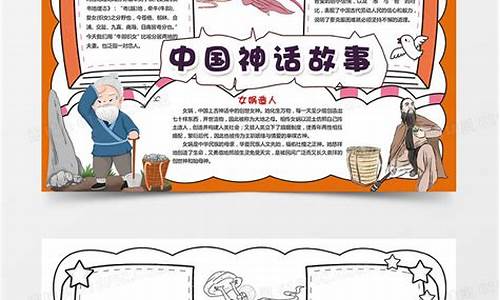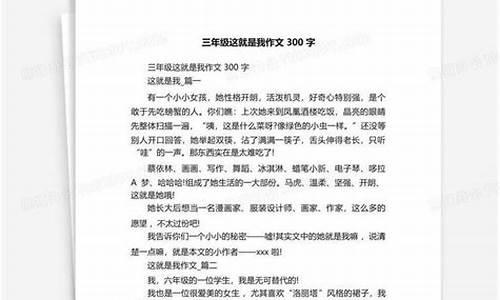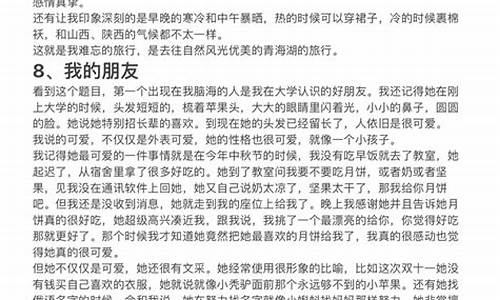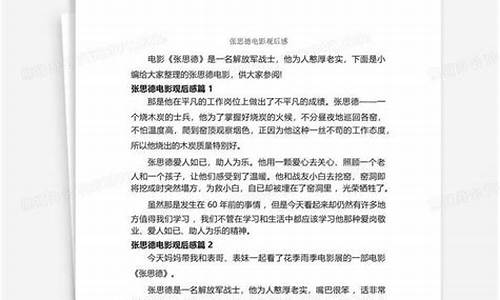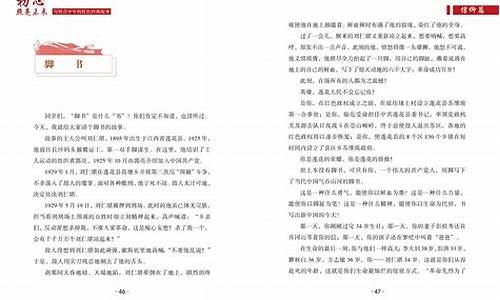您现在的位置是: 首页 > 优质范文 优质范文
小升初英语试卷真题及答案_小升初英语
tamoadmin 2024-09-02 人已围观
简介1.小升初英语考试知识总结2.英语小升初考点3.小升初英语作文范文6篇4.小升初英语:名词解析5.2020小升初英语必考335个短语6.小升初英语语法十个常考知识点7.六年级小升初英语知识点小升初衔接班英语教学内容包括音标、词汇、语法等方面,共15课时。小升初衔接班英语教学旨在帮助学生顺利过渡到初中,培养良好的学习习惯,掌握音标和词汇,扩大词汇量。教学内容包括音标、词汇、语法等方面,共15课时。教
1.小升初英语考试知识总结
2.英语小升初考点
3.小升初英语作文范文6篇
4.小升初英语:名词解析
5.2020小升初英语必考335个短语
6.小升初英语语法十个常考知识点
7.六年级小升初英语知识点
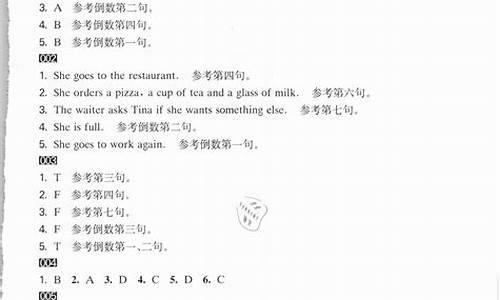
小升初衔接班英语教学内容包括音标、词汇、语法等方面,共15课时。
小升初衔接班英语教学旨在帮助学生顺利过渡到初中,培养良好的学习习惯,掌握音标和词汇,扩大词汇量。教学内容包括音标、词汇、语法等方面,共15课时。教学安排包括音标、词汇、阅读训练等方面,旨在提高学生的英语水平。
英语(英语:English)属于印欧语系日耳曼语族西日耳曼语支,最早被中世纪的英国使用,并因其广阔的殖民地而成为世界使用面积最广的语言。英国人的祖先盎格鲁部落是后来迁移到大不列颠岛地区的日耳曼部落之一,称为英格兰。
这两个名字都来自波罗的海半岛的Anglia。该语言与弗里斯兰语和下撒克森语密切相关,其词汇受到其他日耳曼语系语言的影响,尤其是北欧语(北日耳曼语),并在很大程度上由拉丁文和法文撰写。
发展史
英语已经发展了1400多年。英语的最早形式是由盎格鲁-撒克逊人移民于5世纪带到英国的一组西日耳曼语支(Ingvaeonic)方言,被统称为古英语。中古英语始于11世纪末,诺曼征服英格兰。
1476年,威廉·卡克斯顿将印刷机介绍给英国,并开始在伦敦出版第一本印刷书籍,扩大了英语的影响力。自17世纪以来,现代英语在英国和美国的广泛影响下在世界各地传播。
小升初英语考试知识总结
小升初的英语怎么辅导如下:
1、语文知识要点。
词语的辨析,需要掌握的词语包括,同音字、近义词、反义词、成语、俗语等。基本句型和语法,包括简单句、并列句、复合句、特殊疑问句等。阅读理解,需要能够阅读各类文体的文章,理解文章的大意、结构、意图等。
2、数学知识要点。
数的概念,需要掌握自然数、整数、有理数、实数等概念。数量关系,需要掌握加、减、乘、除等运算,并能解决一些基本的比例和分数计算问题。巧芹几何图形和立体图形。需要掌握各种几何图形的名称、性质和应用,以及三维图形的定义和特征。
3、英语知识要点。
词汇量和语法,需要掌握基础的英语词汇,掌握英语动词的各种时态、用法,以及基础的语法知识。阅读和听力。需要阅读各类短文、故事、新闻等英语文章,并能理解文章的大意和细节。
小升初要注意的方面:
1、提前做好预习。
首先,学生需要提前准备。小升初的考橘森试内容主要是根据初中的课程内容来设置的,因此,学生需要提前了解初中的学习内容,并进行有针圆宽亩对性的准备。他们可以通过重点预习初中的知识点,做一些模拟试题,以便熟悉考试的形式和题型。
1、合理规划时间。
学生需要合理规划学习时间。在备考期间,学生应该合理安排学习和休息的时间。他们应该制定一个详细的学习,将每天的学习时间分配到不同的科目和知识点上。同时,他们还应该留出适当的时间进行休息和放松,以保持良好的精神状态。
2、多做练习。
学生需要做好练习。做题是提高学习能力和考试成绩的关键。学生可以通过做大量的习题,巩固所学的知识,提高解题能力。可以选择一些辅导书、习题集或者在线学习平台上的习题进行练习。
英语小升初考点
学习是需要总结的,下面我整理了小升初英语考试知识总结,欢迎大家参考借鉴!
小升初英语考试知识总结(一)小升初考试已经陆续来临,大敌当前,各位小朋友们是否已经开始摩拳擦掌、跃跃欲试了呢?此时在做大量习题是是否会经常遇到很多个奇形怪状的“拦路虎”呢?那我们就一起来解决这个问题吧!
在小升初当中,涉及到的词汇有2000个左右,500个左右是基础词汇,1000个左右是拓展词汇(这些较难的词汇在阅读、完成中出现的机会很大),其中最重要的词汇----高频词汇共有400--500个。那这么多的词汇,我们在这么短短的时间内很难一下都记牢,这也就需要我们找到一些背单词的小窍门了。
方法一:相同字母记忆法
猫和老鼠: 威风凛凛的:
有一个rat(老鼠) 美国是个union(联邦)
非常的fat(肥胖) 人口不到billion(十亿)
跳进了vat(缸) 都有opinion(意见)
偷吃了salt(盐) 总统才是champion(冠军)
变成了bat(蝙蝠) 宝座下垫cushion(垫子)
气坏了cat(猫) 口里咬着union(洋葱)
咬破了hat(帽子) 薪水超过million(百万)
当成了mat(垫子) 君临天下像lion(狮子)
记单词是个长期的功夫,这里是今天交给大家的第一个方法,通过这个方法可以一下子记一串的单词,孩子们可以按照老师的这个方法自行把这样的单词编起来,自己编出来的东西印象会更深呢!
小升初英语考试知识总结(二)分类式联想记忆
上次我们所说的是把相似的单词串成故事,通过记一个故事的形式来把相似的单词记住。今天我们要说的利用开头字母的变化来记住单词:
1、each 每个、各自
beach 海滩、沙滩
2、ink 墨水
pink 的粉色的
3、oil 油、石油
boil 沸腾、煮沸
4、rush 冲、奔跑
brush 刷子、画笔
5、clap 拍、击
lap 膝部、跑道的一圈
6、limb 肢、臂、树枝
climb 爬、攀登
7、ash 灰烬、灰
dash 猛冲、飞奔
8、raise 举起、增加
praise表扬
9、cold 冷的
scold 责备
10、under 少于、低于
thunder 雷、雷声
11、lake 湖
bake 烘烤
12、beat 打、打击
neat 整洁、干净
13、blue 蓝色的
clue 线索
14、blow 吹
folw 流动
15、table 桌子
cable 电缆、电报
16、corn 谷物、小麦、玉米
horn 号角、喇叭、警报器
17、dam 坝、堤
jam 果酱、堵塞
18、lamp 灯
damp 潮湿的、微湿的
19、full 满的、充满的
dull 枯燥的、乏味的
20、fire 火、火灾
hire 雇佣
小升初英语考试知识总结(三)我们要学的方法是词根词缀记忆法,可能有些单词偏难,但主要是让孩子掌握的这些词缀,对“猜”阅读理解和完形填空的生词有极大的帮助!
1) aer, ar, 含义是“空气,大气” aeroplane, aerial,
2) ag, act, ig, 含义是“做,动作” active, agent, reaction,
3) alt, 含义是“高”, altitude,
4) alter, altern, altr, 含义是“其它,变更” alternate,
5) bio, bi, bion, 含义是“生物,生命” biology, bionics(仿生学)
6) brev, bri, brief, 含义是“短” brief, abbreviation, abridge(节略)
7) cap, capt, cept, cip, 含义是“取,获” capture, except, concept, capacity
8) ced, ceed, cess, 含义是“行,让步” proceed, succeed, excess(过度)
9) centr, centr, 含义是“中心” concentrate, eccentric(偏心的)
10) clain, clam, 含义是“呼喊” claim, proclaim, exclaim
11) clos, clud, 含义是“闭合” conclude, enclose, include
12) col, cult, 含义是“耕耘” colony, cultivate, agriculture
13) cor, cord, 含义是“心” cordial, record, accord
14) curr, cur, cour, 含义是“跑,动作” current, occur, concurrence(同时发生)
15) dic, dict, 含义是“说,示” dictate, edit, indicate, predict
16) doc, doct, 含义是“教” doctor, document
17) duc, duct含义是“引导,传导” introduce, produce, conduct, deduct( 推论)
18) fact, fac, fect, dic, dit, 含义是“做,创造” factory, effect, profit, faculty, perfect
19) fend, fens, 含义是“打,击” defence, offence
20) fer, 含义是“搬运,移转” ferry, transfer, defer(迟延)
21) fin, finit, 含义是“终,极” final, finish, confine
22) firm, 含义是“坚固” firm, confirm, affirm(断定)
23) fix, 含义是“固定” prefix, affix(附加)
24) flect, flex, 含义是“弯曲” flexible, reflex
25) flor, flour, flower, 含义是“花” flower, flourish
26) form, 含义是“形” uniform, formula, transform, reform, deform
27) forc, fort, 含义是“力,强度” force, enforce, effort
28) gen, genit, 含义是“生产,发生” generate, generation
29) gram, graph, 含义是“书写,记录” telegram, diagram, photograph
30) grad, gress, gred, gree, 含义是“步,阶段” gradually, degree, progress
31) hab, habit, hibit, 含义是“保持,住” inhabit, exhibit, prohibit
32) her, hes, 含义是“粘附” adhere, cohesion
33) ject, jet, 含义是“抛射” project, inject
34) jour, 含义是“日,一天” journal(日记), journey, adjourn(延期)
35) jug, junct, 含义是“结合,连合” conjunction, junction(连合)
36) labour, labor, 含义是“劳动,工作” labourer, elaborate, collaborate
37) lect, leg, lig, 含义是“挑选,集” collect, select, lecture
38) lif, liv, 含义是“生活,生存” life, alive, live
39) loc, 含义是“场所,位置” location, dislocate(脱位)
40) long, leng, ling, 含义是“长的.” length, prolong, linger
巧计小升初常考词汇(四)
guilt 有罪 故意来踢你
poverty 贫穷 一切都over了,当然很贫穷
property 财富 p爬
praise 赞扬 我趴在地上举起双手,为你喝彩===赞扬
loop 环形 一百个人趴在地上,围成一个环形
glimpse 一瞥 表示快速的无意识的一瞥
glance 一瞥 快速的有意识的一瞥
love at the first glimpse/sight 一见钟情
gaze 凝视 一男生看男生超过6妙,那你就对她感兴趣哦
peer 努力地看 眼精眯着看,眼角有微笑
dict--一再的
addict--一再的
commence 开始 开门就死
commend 赞扬 帮你缝好了,你当然要赞扬他啦
economy 经济
economic 经济的
economical 节约的
frugal 节俭的 只要吃豆腐乳就够了
serve---词根保留
reserve 储备 ;预定 反复帮你保留
reservation 预定(房间)
preservative 防腐剂 保存的腊肠等都要的哦
mini ==小的
mini hy country 小日本
minister 大臣 牧师 大臣跟皇帝说:在下,小人
diminish 减少 一个已经很小了,分成两个,当然就是减少
commence 开始 开门就开死了,我们讲过的哦
go hiking 远足
go camping
campus 校园 露营加我们就是 大学哦
successor 后来者,继任,一般是工作的人
ancestor 祖先 forebear
offspring 从你后面弹出来的人,就是后代
小升初英语作文范文6篇
1.动词be ( is,am,are ) 的用法
我(i)用am,你(you)用are, is 跟着他(he),她(she),它(it)。单数名词用 is,复数名词全用are。变否定,更容易,be后not 加上去。变疑问,往前提,句末问号莫丢弃。还有一条须注意,句首大写莫忘记。
2 . this, that 和i用法
(1)this 和 that 是指示代词,it 是人称代词。(2)距离说话人近的人或物用 this,距离说话人远的人或物用that(3)放在一起的两样东西,先说 this,后说that。(4)向别人介绍某人时说 This is.., 不说 That is.。(5)This is 不能缩写,而 That is 可以缩写。(6)打电话时,介绍自己用 this,询问对方用that.(7)在回答 this 或 that 作主语的疑问句时,要用it 代替this 或that。
3 .these 和 those 用法
this, that, these 和those 是指示代词,these 是this 的复数形式,指时间,距离较近的或下物.
4.名词+‘s所有格
单数名词后直接加 “‘s”
以s结尾的复数名词,只加“‘”
不以s结尾的不规则名词复数,加“‘s”
表示两者共同拥有时,只在最后一个名词后加’s
Lucy and Lily’ s mother 露茜和莉莉的妈妈(共同的妈妈,一个妈妈)
表示两者各自拥有时 ,要在每个名词后加’s
Lucy' s and Kate’ s rooms 露茜和凯特的房间(各自的房间,两间房子)
5. There be 句型
There be 句型主要用以表达 “某处(某时)有某人(某物)。〞其基本结构为 "There be
+某物(某人)+某地(某时)〞其中 there 是引1号词,没有词义;主语是 be 后面的名词be 是谓语动词 在一般现在时中 be 只用 is和are 两种形式.下面这首歌诀可帮你巧记 there
be 句型结构:
There be 放句首,主语跟在后。地、时放句末,强调置前头。如:There is a book on the desk.
有时为了强调地点,也可把介词短语放在句首。如:On the desk there is a book.
注意:如果“be〞后的主语是由 and 连接的两个或两个以上的名词 ,那么be 的形式要遵循“远亲不如近邻〞的原则。也就是说,“be’的形式是由与它最近的那个名词来确定的。若那个名词是单数或不可数名词要用 is,是复数就用 are。
6. like 一词的用法
like 用作及物动词 ,译为 “喜欢”。(1)后接名词成代词,表示壴欢某人成某物(2)后按动名词,表示 ,喜欢做某事”(3)后接动词不定式(to do),表示“偶尔地喜欢做某事”,着重于某次具体的行为。
7 .句子单数变复数 ,注意以下五要素
(1)主格人称代词要变成相应的复数主格人称代词,即I-we, you-you, she he.it- they。(2)am, is 要变为are.(3)不定冠词a,an 要去掉。(4)音通单数名词要变为复数形式。(5) 指示代词this, that 要变为these, those.
8 .英语日期的表示法
英语中月份和星期名称都是专有名词,它们的首字母必须大写,并目前面无需用冠词。用英语表示日期,其顺序为月+日+年,日和年之间需用逗号隔开。如:August 2nd2003(2003年8月2日)。也可以用日+月+年来表示。如:10th May, 2003(2003年5月10日)英语日期前介词的使用:若指在哪一年或哪一月,则用介词 in ,若具体到某一天用on
小升初英语:名词解析
#小学英语# 导语英语作文是英语学习的重要内容之一,也是学生综合能力的体现。它与学生的词汇量、语法、句法能力和逻辑思维能力等有密不可分的关系,在高考中占有相当大的比重。而许多学生在此方面丢分甚多,以致影响最后总分,因此提高学生写作能力势在必行。以下是 整理的《小升初英语作文范文6篇》相关资料,希望帮助到您。
篇一小升初英语作文范文
The Hy Spring Festival Spring festival is on the first day of the first lunar month. Chinese people most like the Spring Festival. During Spring Festival, Chinese people like hing meals with their families, playing fireworks in the open air. My sisters and I played fireworks on that day. We had many fireworks. They were very beautiful. They were running into the sky and breaking into pieces. They looked like flowers in the sky. We were very hy and excited. After that, I made a wish. I hope that, we can he a hy and healthy life next year and everyone in my family can be hy. I enjoy the festival very hy.篇二小升初英语作文范文
I he moved to my new school since Septmber. It is a modern and nice school which is in Beijing. It has a playground, a library, several labs, classrooms with electronic equipment and so on. It's quite different from my old school. It's larger, much more modern. This is why I love my new school. If you are free, you are warmly welcomed to come to our school to he a look.篇三小升初英语作文范文
I he a very hy family.There are four people in my family--my parents ,my younger brother and I.My fathther is working in another city,so he is always very busy.As a famous saying goes :" There is always an able woman behind a successful man ."my mother is a housewife.She can cook very dilicious food and she is often busy with some houseworks.Sometimes,brother and I help her tidy the house,but of course,we couldn't tidy as clean as her.I love my parents as well as my family.I hope we can be hy forever!
篇四小升初英语作文范文
December 3 is Miss Pan's birthday. I want to wish her a hy birthday here. But I couldn't get on that day. I was so worried.Although it's a blessing for being late, I still want to say: "hy birthday, Mr. Pan. I wish you hy every day, healthy and hy!"
My mother said that if we were naughty and didn't study hard, the teacher would grow old. I must study hard, don't let the teacher worry, let teacher pan be young and beautiful forever!
Thank you, Miss Pan!
篇五小升初英语作文范文
OK, let me tell you something about my weekend.I am going to do many things and be very busy on the weekend. So I do my homework on Saturday morning. In the afternoon, I am going to do housework with my mother. Because I am a good girl, I am helpful at home. On Sunday morning, I am going to visit my grandparents with my parents. In the afternoon, we are going to the park together. Because there is a kite show. And my grandparents likes making kites. I think, we can see many beautiful kites there. And we are going to buy some beautiful kites, too. Then, we are going to fly the new kites, that’s fun. In the evening, we are going to he a big dinner. We are going to he fish for dinner. Because my grandparents likes eating fish. And my grandma cooks fish well. After dinner, we are going to watch TV together. We are going to be very hy.
篇六小升初英语作文范文
I'm going to the sun on my holiday. I will go there by a spaceship. I will take a big blue spaceship.Then I'll pilot the spaceship to the sun. The sun is very hot. So I put on the super-shirt. In the morning, I will he some sun burger for my breakfast.
At eight o'clock, I will play with my friends there. They are super dog and super girl. Super dog is white and black. Super girl is very clever. Super girl and super dog like to play with me. So I play with them for forty minutes. Then I do my homework in my little red room on a small blue table. After my home work, I will he my lunch. I will eat sun salad. I will make some red toy bear to the sun babies. I will he red juice, red fish and red rice. All the things are red. Then I need a lot of water on the sun because the sun is too hot. So I will walk to the spaceship. I'll pilot the spaceship to the earth.
This is a good holiday on the sun.
2020小升初英语必考335个短语
小升初英语:名词解析
定义: 名词是人类认识事物所使用的基本词汇,是用来表示人、事物、地方、现象或抽象概念的名称的词。在句中可以作主语、宾语、表语、定语、状语、称呼语等。
分类: 名词分为专有名词和普通名词,普通名词又分为可数名词和不可数名词。
考点:
1、可数名词变复数
⑴加-s。如desk-desks,dog-dogs
⑵以s,x,sh,ch,z等结尾,在词尾加-es,如:class-classes,bus-buses,watch-watches
⑶以f或fe结尾,变f或fe为v加-es。如:knife-knives,wife-wives
⑷以辅音字母加y结尾,变y为i,加-es。如:family-families,city-cities
⑸以辅音字母加o结尾,加-es。如:tomato-toamoes,hero-heroes
⑹特殊变化。如▲man-men,foot-feet,mouse-mice,child-children
▲sheep-sheep,deer-deer,fish-fish,Chinese-Chinese
2、集合名词做主语
⑴有些名词不能用a,one,two等具体数词修饰,只能在其前面加the表示全体…。
如:the people,the police,the cattle等。这些词作主语时谓语动词用复数。
⑵有些名词作主语时,谓语动词既可以是单数也可以是复数。
如:public,family,class,team,group等。
3、不可数名词量的表示
不可数名词不能和数词直接连用。他们可以和一下词语或词组连用:
some/any,little,a little,much,a lot of等。
a piece of,a pound of,a cup of,a bar of,a loaf of等。
4、名词所有格
⑴一般的情况在词尾加’s,以s结尾的加s’。如:the boy’s bag,boys’ bags
⑵无生命东西的'名词用of属格。如:the window of the room
⑶东西为两人共有,只在后一个名词后面加’s。如:Lily and Lucy’s room
⑷名词所有格所修饰的词,有时可以省略。如the doctor’s
⑸双重所有格:▲a,an,this,that+名词+of+名词性物主代词。如:a friend of mine
▲可为名词+of+名词的所有格。如:a teacher of my sister’s
小勇士们,对于名词的概念和用法掌握的怎么样了?下面的小测验,帮助你查漏补缺,快来做做吧!
1. Apple is a __ word.
A. five-letter B. five-letters C. fives-letters D. five letters
2. All the __ in the hospital got a rise yesterday.
A. women doctors B. woman doctors
C. women doctor D. woman doctor
3. After ten years, all those youngsters became __
A. growns-up B. growns-up C. grown-up D. grown-ups
4. The police investigated the __ about the bank robbery.
A. stander-by B. standers-by C. stander-bys D. standers-by
5. She used to he three __ .
A. boys friends B. boys friend C. boy friends D. boy friend
6. The committee __ been arguing about the economic problems among themselves for many hours.
A. he B. has C. could he D. can he
7. Seventy percent __ illiterate in that area.
A. is B. are C. is to be D. can he
8. His trousers __ in his suitcase.
A. is always kept B. are kept always
C. are always kept D. he always been
9. The young couple bought __ for their living room.
A. some new furniture B. some new furnitures
C. many new furniture D. many new furnitures
10. Mathematics __ easy to learn.
A. is B. are C. can D. feels
Keys:D A D B C A B C A A
解析:
1、D 有-连字符的,在其名词部分后加s,如 five-letters,standers-by,lookers-on;无名词部分的,在复合词后加s,如grown-ups。
2、A 由man或woman作为第一部分的复合名词表职位时,均用复数,如men doctors,women writers。
3、D 答案见第一题解析。
4、B 答案见第一题解析。
5、C 由boy或girl 作为第一部分的复合名词,要在最后词后加-s,如boy friends,girl friends
6、A 集体名词被看作若干个体时,具有复数概念,被看作一个整体时,具有单数概念。这类词有:family,,class,surrounding,committee,club,company
7、B 此题在70%后省略了people。根据题意可以知道,这个地区百分之七十的人是文盲。所以用are
8、C 具有成双含义的词,如服装类、工具类的词:trousers,glasses,scissors(剪刀),后面的动词用复数。
9、A
Furniture 家具,不可数名词。Many修饰可数,much修饰不可数,some,any都可修饰,但any用在疑问和否定句中。a few修饰可数,肯定含义;a little 修饰不可数,否定义。
10、A 学科类的词,如maths , economics , politics , electronics ,mechanics(力学)等,含有复数概念。试卷尽在巨人奥数网。
;小升初英语语法十个常考知识点
小升初英语考试需要孩子有扎实的短语功底,要求孩子做单选题、语法题不会错。接下来我为大家介绍小升初英语考试必考相关内容,一起来看看吧!
2020小升初英语必考335个短语
1
1. a bit (of) 有一点儿
2. a few 一些; 少量;几个
a little一些; 少量
3.a group of 一群
4. a kind of 一种; 一类
5. a lot of (lots of)=a number of 许多
a number of 一些;许多
6. a pair of 一双; 一副
7. a piece of "一(块,张,片,件)"
8. according to 按照;根据
9. after class 课后 after all "终究, 毕竟"
10. after school 放学后
11. agree with sb/ to+V. 同意某人的意见/某事
12. again and again 反复地;在三地
13. all over 到处;遍及;结束
14. all right 行了;好吧;(病)好了
15. all the best 一切顺利; all the same 还是, 仍然
16. all the time 一直
17. all the way 一路上
18. and so on 等等
19. apologize to sb. for sth. 为某事向某人道歉
20. arrive at / in a place 到达某地
21. as well 也;又
22. ask for 请求; 寻求
23.at breakfast /lunch /supper 早/午/晚餐时
24. at first / last 起先;开始的时候/ 最后;终于
25. at home 在家(里)
26. at least / most 至少/ 至多
27. at once 立刻;马上28. at present "现在, 目前"
29. at school 在学校;在上课
30. at the moment "此刻,目前; 那时,当时
31. at the same time 同时
32. at work 在工作
33. at the / on weekends 在周末
34. be able to 能够(有能力)
35. be afraid of 害怕
36. be angry with sb. 生某人的气
37. be bad for 有害于
38. be born 出生于
39. be busy with / doing sth. 忙于做某事
40. be careful with 小心
41. be covered with 被?覆盖
42. be different from 与?不同
43. be familiar to 对?熟悉
44. be famous for 以?而著名
45. be fond of 爱好
46. be full of 充满
47. be good / poor at 善长于 / 对?比较差
48. be interested in 对?感兴趣
49. be keen on 喜爱
50. be late for ?...迟到
51. be located (in/on/at) 位于
52. be made of 由?制成
53. be made up of 由?组成
54. be on "上演, 上映"
55. be pleased with 对?满意
56. be proud of 为?而感到自豪
57. be/get ready for 为?作准备
58. be surprised at 对?...感到惊奇
59. be thankful to sb. 对某人很感激
60. be/get used to+v-ing 习惯于
61. be worried/serious about 为?而担心
62. because of=thanks to 由于
63. belong to 属于
64. break out 爆发 break into "闯入, 破门而入"
2
65. by air mail 寄航空邮件
66. by bus 乘公共汽车
67. by oneself 亲自
68. by phone 打电话
69. by the way 顺便说;顺便问一下
70. call on 拜访
71. care for 照顾; 喜欢
72. carry out 执行
73. catch (a) cold 着凉;伤风
catch up with 赶上(或超过)
74. change one's mind 改变主意
75. check in 办理登机
76. come across 被理解; 遇见
come back 回来;想起来
77. come from 出生于;来自
78. come on 快;走吧;跟我来
come out 出来;(书等)出版,发行
79. come to an end 结束
80. come to know 知道
81. come to life 显得逼真; 苏醒
82. come true 实现
come up with追上;赶上;想出(主意);找出(答案)
83. communicate with 与?交流
84. compare with 与?比较
congratulate ?on? 祝贺?
85. cover an area of 占地面积
86. cut down 砍倒
87. deal with 处理
88. depend on "依靠,依赖"
89. die of 因?病而死
different from 与?不同
90. do one's best 尽最大努力
91. do sb. a four 帮某人忙
92. do some shopping 买东西 (cleaning)
93. do with 处置, 处理
94. dream of 梦见
95. dress up 穿着打扮
96. each other 互相
. eat up 吃光, 吞噬
earn one?s life 谋生
either? or? 或者?或者?
98. enjoy oneself 过得愉快
99. enter for 报名参加
even if / thought 即使;尽管
100. fall off 从?...跌落
101. far away (from) (离)遥远
far from远离
feel like doing 想要?;感觉要?
102. fill in "填充, 填写"
fill ? with ? 用?填充
103. find out 找出;查明;了解
104. finish off 吃完; 喝完
first of all 首先
105. for ever 永远
106. for example 例如
107. for the first time 第一次
108. for the time being "暂时,眼下"
from ? to? 从?到?
109. from door to door 挨家挨户
110. from now on 从此以后; 今后
111. from time to time 不时;有时
112. get along / on (with) 进展;与?.相处
go away 逃离
113. get back 返回
114. get in 进入;收集
115. get in the way 挡道
116. get off 下车
117. get on 上车
get on with与?.相处
118. get ready for 为?作准备
119. get rid of 摆脱
120. get tired of 对?感到厌倦
3
121. get to 到达 get together 相聚; 联欢
122. get up 起床
123. give back 归还;送回
124. give out 分发
125. give sb. a hand 助某人一臂之力
126. give up 放弃
127. go ahead 先走;向前走;去吧;干吧
go away 走开;离去
128. go shopping / bowling 去购物 / 打保龄球
129. go for a swim 去游泳
go for a walk 散步
130. go home 回家
131. go in for 参加;从事于;酷爱
132. go on 继续
133. go on a diet 实行节食
134. go on a picnic 去野餐
135. go on with / doing sth. 继续做某事
136. go out 熄灭
137. go over 复习;仔细地再读一遍
138. go sightseeing 去观光
139. go to (the) hospital 去医院(看病)
140. go to bed 就寝
141. go to college 上大学
142. go to school 上学
143. go to sleep 入睡
144. go to the cinema / movie(s) 去看**
145. go up 走上前去 146. go wrong 出错
147. grow up 成年;长大
148. had better 最好还是;还是?好
149. hand in 上交
hand out 分发
150. hen to do 碰巧做
151. hen to sb. 发生到某人身上
he fun with玩得高兴
he fun doing?玩得高兴
152. he (got) to 不得不
153. he a class / lesson 上课
154. he a good time 玩得很愉快;过得很愉快
155. he breakfast 吃早餐
156. he no idea 不清楚
157. he pity on sb. 怜悯某人
158. he sports 进行体育活动
159. hear from 收到?来信
160. hear of 听说
161. help sb. with sth. 帮助某人做某事
help oneself to ? 请随便吃点?
162. here and there 到处
163. hold a meeting 举行会议
164. hold on 等一等(别挂电话)
165. hold one's breath 屏住呼吸
166. hold up 举起
167. huge amounts of 大量的
hundreds of 几百;成百上千
168. hurry off 匆忙离开
hurry up 赶快;快点
169. in a hurry 匆忙; 很快地
170. in a minute 一会儿
in a word 简言之; 总之
171. in addition 另外
172. in all 总共
173. in charge of "主管,负责"
in danger 处于危险状态
174. in English 用英语
175. in fact 事实上;实际上
176. in front of 在?前面
177. in hospital 住院
178. in line 成一排;成一直线
179. in no time 立刻
180. in one's fifties 在某人五十多岁时
4
181. in one's opinion 根据某人看法
182. in order 按顺序
in order to 为了
in other words 换句话说
183. in return 作为回报
184. in surprise 惊奇地
in public 当众;公开
in surprise 吃惊;惊讶
185. in the end 最后;终于
186. in the future 在将来
187. in the middle of 在?中间
188. in the years to come 在即将来临的几年里
189. in this way 这样
190. in time 及时
instead of 代替;而不是
191. in trouble 处于困境中
192. instead of 代替;而不是
193. join in 参加;加入
194. just a minute 等一下
195. just now 现在;刚才
196. keep doing sth. 继续做某事
1. keep fit 保持健康
keep one?s word 守信
198. keep... from 使?不做
199. keep in touch (with) (与?)保持联系
200. keep off 阻挡;不让?接近
201. keep quiet 保持安静
202. keep sb. busy 让某人忙个不停
203. knock over 撞倒;撞翻
204. later on 过后;后来
205. laugh at 嘲笑
206. lay the table (饭前)摆好餐具
207. learn?from 向?学习
208. lee (secondary) school (中学)毕业
209. lee a message 留个口信
210. lee for 动身去
211. less / more than 少于 / 多于
212. let out 放出
213. line up 整队; 排成行
214. listen to 听?(讲话)
215. live on 靠?为生
216. look after 照料;照顾
look down upon 看不起;轻视
217. look at 看;观看
218. look for 寻找
219. look forward to+V-ing 期待着
220. look like 看上去象;显得
221. look out of 从?朝外看
222. look up 查寻; 抬头看
223. lose one's way 迷路
224. lose weight 减肥
225. make a face 做鬼脸;做苦脸
make a film 拍**
226. make a fire 生火
227. make a living 谋生
228. make a mistake 出差错;犯错误
229. make a noise 弄出声
230. make friends with 与?交朋友
231. make fun of 拿?...开玩笑
232. make money 挣钱;赚钱
233. make the/one's bed 整理床铺
234. make out 辨认出
235. make progress 取得进步
236. make up one's mind 下决心
237. meet the needs of 迎合?的需要
238. meet with 遭遇
239. more or less 或多或少
neither? nor? 既不?也不?
next to 紧挨着; 紧靠着
240. no longer / not ?any more/longer 不再
5
241. not?at all "(用来加强语气)一点也不,根本不"
not only ?but also? 不仅?而且?
not so?as 不像?;不如?
not till / until ? 直到?才?
242. now and then /again 时而; 偶而
243. of course 当然
244. of one's own 属于某人自己的
245. on business "有事, 出差"
246. on duty 值日;值班
on foot 步行;走路
247. on holiday 在休
248. on one's side 在某人一边
249. on show 在展出
250. on the other hand 另一方面
251. on the phone 在听电话
252. on the right 在右边
253. on the/one's way (to) 在去?的路上
254. on time 准时
255. on weekdays 在工作日
256. once a day 每天一次
once again 在一次
257. once every four years 每四年一次
258. once more 再次
259. once upon a time 从前;很久以前
one after another "一个接一个,连续地"
260. one another 互相
261. operate on sb. 为某人动手术
262. out of 从?里出来; 缺乏
263. out of work 失业
out of date 过时
264. over and over 再三; 一遍又一遍
265. over there 在那边
266. pass by 经过
pay for 付?...钱; 买
267. pick out 挑选出
268. pick up 拾起
269. play a trick on 捉弄
270. play with 玩弄
271. plenty of 许多
272. point at 指向;指着
273. point out 指出
274. praise sb. for sth. 为某事表扬某人
275. prefer?to (比起?来)更喜欢
276. prepare for 准备
277. protect?from 保护?免受
prevent ?from?妨碍;防止;预防
278. pull down 推倒
279. put down 记下
put off 延期; 推迟
280. put on 穿; 戴上;上演
281. put out 伸出; 扑灭
282. put up 举起; 挂起
283. rely on 依靠
284. right now "立刻,马上"
285. ring up 打电话给?
run after 追捕;追踪
286. run away 逃跑
run out of 用完
287. se one's life 挽救某人生命
288. search for 搜寻; 搜查
289. see?off 为?送行
290. sell out 售完
291. send for 派人去叫?
292. separate ? from 分开
293. set free 释放;解放
293. set off 动身;启程;使爆发
294. set out 出发;开始
295. show off 炫耀
296. so far 到目前为止
2. so?that 太?以至于?
298. sooner or later 迟早;早晚
299. speed up 加快速度
300. spend ?on 在?花钱
301. stand for 代表
302. stop doing sth. 停止做某事(不再做?)
303. stop to do sth. 停下来做某事(开始做?)
304. such as 例如
305. take away 拿走
306. take it easy 别着急;别紧张
307. take off 脱下;起飞
308. take one?s time 从容;别紧张
309. take out 取出
310. take place 发生
311. talk about 谈论;议论
312. the day after tomorrow 后天
313. the day before yesterday 前天
314. the more? the more 越?就越?
315. the other day 前几天;某日
316. think about 考虑(是否去做)
317. think of 想起;考虑;认为;看法
318. thousands of 成千上万;几千
319. throw away 扔掉
320. too?to? 太?以至于不?
321. try on 试穿;试试看
322. try out 试验
323. turn down 关小;调低
324. turn off 关掉(水、电视、收音机等)
325. turn on 打开(水、电视、收音机等)
326. turn over 翻动;梨翻(土地)
327. turn up 到达;来到;开大(声音等)
328. up and down 上下,来回
329. used to do sth. 过去常常
330. wait for 等候,等待
331. wake up 醒来
332. work out 算出, 解决
333. worry about 担心,烦恼
334. write down 写下,记下
335. write to 写信给?
小升初英语必备知识点总结
在升初中的英语考试中,重点中学所出的小升初英语考试题,都会对学生提出更高的要求,主要的知识点总结为以下几个方面:
1、词汇量:一般重点中学的小升初英语考试,都要求学生具有2000到3000的词汇量,而且要求学生能读、能听懂这些单词,甚至要求孩子会拼写。很多孩子认为小升初英语考试卷中的英文奥数题比较难,主要障碍就是很多单词不会,这样扣分之后,跟其他孩子就有差距了。所以这里为大家提供了一些专家研究的单词记忆法,希望对大家有用。克服小升初英语单词记不住的速记方法 小升初孩子记忆英语单词8个方法
2、语法:小升初英语考试需要孩子有扎实的语法功底,要求孩子做单选题、语法题不会错。
3、实际运用能力:知识学到手会用才守键。
小升初英语阅读题中,主要考察孩子的还是词汇搜索的能力,就是需要孩子看到问题之后,会返回原文找答案,并选出正确的答案。
摘要写作中,需要孩子能根据问题来写文章,主要考察的是孩子的连词成句能力。
英文奥数题中,孩子不仅要学会猜测不认识的单词含义,还要具备翻译题目的能力,然后解题。
六年级小升初英语知识点
#小升初# 导语小升初英语语法怎么复习呢?有什么常考的知识点吗?下面跟 一起来看看小升初考试常考知识点,希望对同学们复习英语有帮助!
1、动词be(is,am,are)的用法
我(I)用am, 你(you)用are,is跟着他(he),她(she),它(it)。单数名词用is,复数名词全用are。变否定,更容易,be后not加上去。变疑问,往前提,句末问号莫丢弃。还有一条须注意,句首大写莫忘记。
2.this,that和it用法
(1)this和that是指示代词,it是人称代词。
(2)距离说话人近的人或物用this, 距离说话人远的人或物用that。如: This is a flower. 这是一朵花。(近处)
That is a tree. 那是一棵树。(远处)
(3)放在一起的两样东西,先说this, 后说that。如:
This is a pen. That is a pencil. 这是一支钢笔。那是一支铅笔。
(4)向别人介绍某人时说This is…, 不说That is…。如:
This is Helen. Helen, this is Tom. 这是海伦,海伦,这是汤姆。
(5)This is 不能缩写, 而That is可以缩写。如:
This is a bike. That’s a car. 这是一辆自行车。那是一辆轿车。
(6)打电话时,介绍自己用this, 询问对方用that。如:
-Hello! Is that Miss Green? 喂,是格林**吗?
-Yes, this is. Who’s that? 是的,我是,你是谁?
注意:虽然汉语中使用“我”和“你”,但英语中打电话时绝不可以说:I am…, Are you…?/Who are you?
(7)在回答this或that作主语的疑问句时, 要用it代替this或that。如:
①-Is this a notebook? 这是笔记本吗?
-Yes, it is. 是的,它是。
②-What’s that? 那是什么?
-It’s a kite. 是只风筝。
3.these和those用法
this, that, these和those是指示代词,these是this的复数形式,指时间,距离较近的或下面要提到的人或事;those是that的复数形式,指时间、距离较远或前面已经提到过的人或事物。
①This is my bed. That is Lily’s bed. 这是我的床。那是莉莉的床。
②These pictures are good. 那些画很好。
③ Are those le trees? 那些是苹果树吗?
在回答主语是these或those的疑问句时,通常用they代替these或those以避免重复。如:
④Are these/those your les? 这些(那些)是你的苹果吗?
Yes, they are. 是的,他们是。
4.名词+’s所有格
单数名词后直接加 “ ’s ”:
Jim’s coat 吉姆的外套 Jeff’s mother杰夫的妈妈
以s结尾的`复数名词,只加“’”
Teachers’ Day教师节 the twins’ books双胞胎的书
不以s结尾的不规则的名词复数,加“ ’s ”
Children’s Day 儿童节 men’s shoes男式鞋
表示两者共同拥有时,只在最后一个名词后加’s
Lucy and Lily’s mother 露茜和莉莉的妈妈(共同的妈妈,一个妈妈)
表示两者各自拥有时,要在每个名词后加’s
Lucy’s and Kate’s rooms 露茜和凯特的房间(各自的房间,两间房子)
5.There be句型
(1)There be句型主要用以表达“某处(某时)有某人(某物)。”其基本结构为“There be+某物(某人)+某地(某时)”其中there是引导词,没有词义;主语是be后面的名词, be是谓语动词,在一般现在时中be只用is和are两种形式。下面这首歌诀可帮你巧记there be句型结构:
There be放句首,主语跟在后。地、时放句末,强调置前头。如:
There is a book on the desk.
有时为了强调地点,也可把介词短语放在句首。如:
On the desk there is a book.
(2)There be句型中的be动词如何确定呢?请先看看下面这首歌诀:
Be动词,有三个,am,is还有are。“There be”真特别,不留am只留俩,那就是is还有are。要用is还是are,须看其后的名词是单数还是复数。若是单数或不可数名词用is,否则就用are。如:
①There is a tree behind the house.
②There is some water(水)in the bottle(瓶子).
③There are some pears in the box.
(3)注意:如果“be”后的主语是由and连接的两个或两个以上的名词,那么be的形式要遵循“远亲不如近邻”的原则。也就是说,“be”的形式是由与它最近的那个名词来确定的。若那个名词是单数或不可数名词要用is,是复数就用are。如:
①There is a book and some pens on the floor.
②There are some pens and a book on the floor.
6.like一词的用法
like用作及物动词,译为“喜欢”。
(1)后接名词或代词,表示喜欢某人或某物。如:
I like the baby very much. 我非常喜欢这个小孩。
(2)后接动名词(v. -ing),表示“喜欢做某事”,着重于习惯、爱好。如:
Tom likes playing football. 汤姆喜欢踢足球。
(3)后接动词不定式(to do ),表示“偶尔地喜欢做某事”,着重于某次具体的行为。如:
I like reading, but I like to watch TV this evening. 我喜欢读书,但我今晚想看电视。
7.句子单数变复数,注意以下五要素
(1)主格人称代词要变成相应的复数主格人称代词,即I→we, you→you,she,he,it→ they。
如:She is a girl. →They are girls.
(2)am,is要变为are。如:
I’m a student. →We are students.
(3)不定冠词a,an要去掉。如:
He is a boy. →They are boys.
(4)普通单数名词要变为复数形式。如:
It is an le. →They are les.
(5)指示代词this,that要变为these,those。如:
This is a box. →These are boxes.
8.英语日期的表示法
英语中月份和星期名称都是专有名词,它们的首字母必须大写,并且前面无需用冠词。
用英语表示日期,其顺序为月+日+年,日和年之间需用逗号隔开。如:August 2nd,2003(2003年8月2日)。也可以用日+月+年来表示。如:10th May,2003(2003年5月10日)英语日期前介词的使用:若指在哪一年或哪一月,则用介词in,若具体到某一天,则需用介词on。
9.时间的表达法
(1) 直读式,即直接读出时间数字
7: 05 seven five 8:16 eight six
(2) 过、差式,即几点差几分,几点过几分。(以30分为分界线)
1:25 twenty-five past one 2:30 half past two
3:43 seven to four 4:38 twenty-two to five
(3)12小时制
6:00 a.m. 上午6点 8:20 p.m. 下午8点20分
(4)24小时制
13:00 13点钟 22:15 22点15分
(5)15分可用quarter
4:15 a quarter past four 5:45 a quarter to six
(6)时间前通常用at.
at 5 o’clock at 7:30 p.m.
10. want用法
(1)想干什么用want to do sth
They want to join the sports club. 他们想加入运动俱乐部。
(2)第三人称单数作主语,want要作变化
①He wants to play basketball.
②Li Xia wants to play the piano.
(3)变疑问句,否定句要借助助动词do或does.
①-Do you want to play ball ? -Yes , I do . / No , I don’t.
②-Does he want to go home by bus ? -Yes , he does . / No , he doesn’t
小升初的英语知识点,你都掌握了吗?下面我给你分享六年级小升初英语知识点,欢迎阅读。
六年级小升初英语知识点(一)学生易错词汇
1. a, an的选择: 元音字母开头的单词用an,辅音字母开头的单词用a.
2 am , is , are的选择: 单数用is , 复数用are. I 用 am , you 用 are.
3 he , has 的选择: 表示某人有某物。单数用has , 复数用he. I ,you 用 he .
4. there is, there are 的选择:表示某地有某物,某人。单数用there is , 复数用there are.
5. some, any 的选择:肯定句用some, 疑问句和否定句用any.
6. 疑问词的选择:what (什么) who (谁) where (哪里) whose (谁的) why(为什么)when(什么时候)which(哪一个)how old (多大) how many (多少)how much(多少钱)
六年级小升初英语知识点(二)动词过去式详解
动词的过去式的构成规则有:
A、规则动词
①一般直接在动词的后面加ed如 worked , learned , cleaned , visited
②以e结尾的动词直接加d如 lived , danced , used
③以辅音字母加y结尾的动词要改y为i再加ed(此类动词较少)如 study ? studied carry ? carried worry ? worried (play、stay)
④ 双写最后一个字母(此类动词较少)如 stopped
B、不规则动词(此类词并无规则,须熟记)小学阶段要记住以下动词的原形和过去式:sing ? sang , eat ? ate , see ? saw , he ? had , do ? did , go ? went , take ? took , buy ? bought , get ? got , read ? read ,fly ? flew , am/is ? was ,
are ? were , say ? said , lee ? left , swim ? swam , tell ? told , draw ? drew , come ? came , lose ? lost , find ? found , drink ? drank , hurt ? hurt , feel ? felt
六年级小升初英语知识点(三)形容词比较级详解
当我们需要对事物作出比较时,需要用到比较级。比较级的句子结构通常是:
什么 + 动词be (am , is , are ) + 形容词比较级 + than(比)+ 什么 ,如:
I?m taller and heier than you. (我比你更高和更重。)
An elephant is bigger than a tiger. (一只大象比一只老虎更大。)
形容词的比较级是在形容词的基础上变化而来的,它的变化规则是:
① 一般的直接在词尾加er ,如 tall - taller , strong - stronger ,
② 以e结尾的,直接加r ,如 fine ? finer ,
③ 以辅音字母加y结尾的,先改y为i再加er,如funny - funnier
④ 双写最后的字母再加er,如big ? bigger, thin ? thinner ,hot ? hotter
☆注意☆ 比较的两者应该是互相对应的可比较的东西。
典型错误:My hair is longer than you.(我的头发比你更长。)
比较的两者是我的头发、你(整个人),那么比较的对象就没有可比性。
应该改为:My hair is longer than yours. 或My hair is longer than your hair.
六年级小升初英语知识点(四) 句型专项归类
肯定句:是指用肯定的语气来陈述的句子,如:I?m a student. She is a doctor. He works in a hospital.
There are four fans in our classroom. He will eat lunch at 12:00. I watched TV yesterday evening.
2、否定句:含有否定词或表示否定意义词的句子,如:I?m not a student. She is not (isn?t) a doctor.
He does not (doesn?t) work in a hospital. There are not (aren?t) four fans in our classroom.
He will not (won?t) eat lunch at 12:00. I did not (didn?t) watch TV yesterday evening.
☆注意☆ 小结:否定句主要是在肯定句的基础上加上了否定词 ?not?。有动词be的句子则?not?加在be后面,可缩写成?isn?t,aren?t?,但am not 一般都分开写。没有动词be的句子则要先在主要动词的前面加上一个助动词(do,does,did),然后在它后面加上?not?,你也可以把它们缩写在 一起如?don?t , doesn?t , didn?t )。这三个助动词要根据人称和时态来选择,其中?does?只用于一般现在时主语是第三人称单数的情况,而?did?只用于一般过去时,不论主语是什么人 称和数,都用?did? 。
3、一般疑问句:是指询问事实的句子,此类句子必须用?yes?,或?no?来回答。如:Are you a student? Yes, I am / No, I?m not.
Is she a doctor? Yes, she is. / No, she isn?t.
Does he work in a hospital? Yes, he does. / No, he doesn?t.
Are there four fans in our classroom? Yes, there are. / No, there aren?t.
Are you going to buy a comic book tonight? Yes, I am. / No, No, I am not. (Yes, we are. / No, we aren?t.)
Will he eat lunch at 12:00? Yes, I will. / No, I will not(won?t).
Are they swimming? Yes, they are. / No, they aren?t.
Did you watch TV yesterday evening? Yes, I did. / No, I didn?t.
☆注意☆ 小结:一般疑问句是在肯定句的基础上,
①把动词be调到首位,其他照写,末尾标点符号变成问号即可。
②没有动词be的句子则要在句首加上一个助动词(do,does,did)再把紧跟在后面的动词变回原形,末尾标点符号变成问号即可。
这三个助动词也要根据人称和时态来选择,其中?does?只用于一般现在时主语是第三人称单数的情况,而?did?只用于一般过去时,不论主语是什么人称 和数,都用?did? 。一般疑问句有个重要的原则就是问和答要一致,即问句里的第一个单词(助动词)和简略答句里的这个词是一致的。
4、特殊疑问句:以特殊疑问词(what , where , who , which , when , whose , why , how等)开头引导的句子。此类句子应该问什么就答什么,不能用?yes 、no?来回答。如:
What is this? It?s a computer.
What does he do? He?s a doctor.
Where are you going? I?m going to Beijing.
Who played football with you yesterday afternoon? Mike.
Which season do you like best? Summer.
When do you usually get up? I usually get up at 6:30.
Whose skirt is this? It?s Amy?s.
Why do you like spring best? Because I can plant trees.
How are you? I?m fine. / I?m hy.
How did you go to Xinjiang? I went to Xinjiang by train.
☆其中how又可以和其他一些形容词连用组成特殊疑问词组用来提问,如: how many(多少(数量)), how much(多少(钱)), how tall(多高), how long(多长), how big(多大), how hey(多重)
例句:How many pencils do you he? I he three pencils.
How many girls can you see? I can see four girls.
How many desks are there in your classroom? There are 51.
☆小结:how many 用来提问可数名词的数量,主要有以上三种句式搭配,
How many + 名词复数 + do you he? 你有多少
How many + 名词复数 + can you see? 你能看见多少
How many + 名词复数 + are there? 有多少
